Location: St. Augustine, FL
Associated Artwork: Summer Day at Over-Fork
Year: 1955
Significance: Cunningham paints from memory, leading to altered appearances from real life and the inclusion of symbols favored by him. An example in this painting are wells for drawing water. Recognizable by the arms for raising and lowering buckets, they are consistently present in other paintings, such as Spoonbill Point which is also a location in St. Augustine.
URL Image:
Collection: Collection of Lynda Joyce Wilson
Current Location: The Mennello Museum of American Art
latitude: 29.9012
longitude: -81.3124
Associated Artwork: Summer Day at Over-Fork
Year: 1955
Significance: Cunningham paints from memory, leading to altered appearances from real life and the inclusion of symbols favored by him. An example in this painting are wells for drawing water. Recognizable by the arms for raising and lowering buckets, they are consistently present in other paintings, such as Spoonbill Point which is also a location in St. Augustine.
URL Image:

Collection: Collection of Lynda Joyce Wilson
Current Location: The Mennello Museum of American Art
latitude: 29.9012
longitude: -81.3124
Location: Boothbay Harbor, ME
Associated Artwork: Gabriel Overlooking Boothbay Harbor
Year: 1960
Significance: Cunningham's interpretation of Boothbay Harbor imparts a sense of serenity which mimics its real life counterpart. Although the exact shapes of the shorelines do not match, and the real version is home to significantly more vessels, Cunningham manages to capture the essence of Boothbay Harbor in its expansive nature. He also includes boats with sails that can be found throughout his paintings.
URL Image:
Collection: Collection of Michael A. Mennello
Current Location: The Mennello Museum of American Art
latitude: 43.8523
longitude: -69.6281
Associated Artwork: Gabriel Overlooking Boothbay Harbor
Year: 1960
Significance: Cunningham's interpretation of Boothbay Harbor imparts a sense of serenity which mimics its real life counterpart. Although the exact shapes of the shorelines do not match, and the real version is home to significantly more vessels, Cunningham manages to capture the essence of Boothbay Harbor in its expansive nature. He also includes boats with sails that can be found throughout his paintings.
URL Image:

Collection: Collection of Michael A. Mennello
Current Location: The Mennello Museum of American Art
latitude: 43.8523
longitude: -69.6281
Location: Everglades, FL
Associated Artwork: Seminole Everglades
Year: 1945
Significance: Cunningham represents the Everglades as a serene location, and his paintings correlate to the numerous paintings and written accounts of the lives of Seminoles and their environment. The brown water and the long shadows are consistent with accounts that were widely available at the time. In this case Cunningham combines his tendency to add his own elements to real locations.
URL Image:
Collection: Collection of The Metropolitan Museum of Art, Gift of The Honorable Marilyn L. Mennello and Mr. Michael A. Mennello, 1997
Current Location: The Metropolitan Museum of Art
latitude: 27.1026
longitude: -81.0734
Associated Artwork: Seminole Everglades
Year: 1945
Significance: Cunningham represents the Everglades as a serene location, and his paintings correlate to the numerous paintings and written accounts of the lives of Seminoles and their environment. The brown water and the long shadows are consistent with accounts that were widely available at the time. In this case Cunningham combines his tendency to add his own elements to real locations.
URL Image:

Collection: Collection of The Metropolitan Museum of Art, Gift of The Honorable Marilyn L. Mennello and Mr. Michael A. Mennello, 1997
Current Location: The Metropolitan Museum of Art
latitude: 27.1026
longitude: -81.0734
Location: South Carolina
Associated Artwork: Ashepoo River in Spring
Year: 1930
Significance: The Ashepoo River empties into the Saint Helena Sound between Charleston and Beaufort. As a direct nod to the fertile lands of South Carolina, Cunningham paints the lands golden, and the image of the shore is completed with pines, fruit trees, birds, and a boathouse. One of Cunningham's quirks, however, presents itself in the presence of a Native American in the regalia of a Plains or Woodlands tribe.
URL Image:
Collection: Collection of The Mennello Museum of American Art
Current Location: Orange County Parks and Rec
latitude: 32.4902
longitude: -80.4237
Associated Artwork: Ashepoo River in Spring
Year: 1930
Significance: The Ashepoo River empties into the Saint Helena Sound between Charleston and Beaufort. As a direct nod to the fertile lands of South Carolina, Cunningham paints the lands golden, and the image of the shore is completed with pines, fruit trees, birds, and a boathouse. One of Cunningham's quirks, however, presents itself in the presence of a Native American in the regalia of a Plains or Woodlands tribe.
URL Image:

Collection: Collection of The Mennello Museum of American Art
Current Location: Orange County Parks and Rec
latitude: 32.4902
longitude: -80.4237
Location: Folly Beach, SC
Associated Artwork: Red Sky Over Folly's Beach, S.C.
Year: 1975
Significance: One of Cunningham's most dramatic paintings, the red clouds loop over the upper left and right corners, mimicking stage curtains, and the water and sky are separated only by thin yellow lines. The sense of coming dawn, coupled with the waters calm enough to reflect the schooners, reflects the serene atmosphere Cunningham experienced at the beach, if not its actual appearance.
URL Image:
Collection: Collection of Marilyn L. and Michael A. Mennello
Current Location: The Mennello Museum of American Art
latitude: 32.6552
longitude: -79.9404
Associated Artwork: Red Sky Over Folly's Beach, S.C.
Year: 1975
Significance: One of Cunningham's most dramatic paintings, the red clouds loop over the upper left and right corners, mimicking stage curtains, and the water and sky are separated only by thin yellow lines. The sense of coming dawn, coupled with the waters calm enough to reflect the schooners, reflects the serene atmosphere Cunningham experienced at the beach, if not its actual appearance.
URL Image:

Collection: Collection of Marilyn L. and Michael A. Mennello
Current Location: The Mennello Museum of American Art
latitude: 32.6552
longitude: -79.9404
Location: Dismal Swamp Canal, Chesapeake, VA
Associated Artwork: Carolina Canal
Year: 1945
Significance: As consistent as Cunningham's irreverence for painting true-to-life landscapes of real locations is his tendency for non-local color. Non-local color is the use of colors that would not have been realistically present in the scene the artist observed. The pink river exemplifies this tendency, and can be found in other paintings by Cunningham. Additionally, this painting shows Cunningham's melding of the water and sky, with only a couple yellow lines as separation.
URL Image: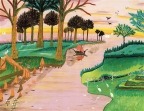
Collection: Collection of Dr. and Mrs. William Baker Allen
Current Location: ~
latitude: 36.7682
longitude: -76.2875
Associated Artwork: Carolina Canal
Year: 1945
Significance: As consistent as Cunningham's irreverence for painting true-to-life landscapes of real locations is his tendency for non-local color. Non-local color is the use of colors that would not have been realistically present in the scene the artist observed. The pink river exemplifies this tendency, and can be found in other paintings by Cunningham. Additionally, this painting shows Cunningham's melding of the water and sky, with only a couple yellow lines as separation.
URL Image:

Collection: Collection of Dr. and Mrs. William Baker Allen
Current Location: ~
latitude: 36.7682
longitude: -76.2875
Location: Castillo de San Marcos, FL
Associated Artwork: Summertime at Fort San Marcos
Year: 1970
Significance: Cunningham painted locations, often with figures and wildlife, and included recognizable elements delineating different Native American tribes. It is unusual for him to have painted a specific historical moment, as he seems to have done here. The fort itself is constructed differently in reality, but it seems Cunningham wanted to illustrate the time when Osceola was imprisoned here. A figure can be seen in nineteenth century military regalia, and the fort in the painting has a heightened jail-like appearance.
URL Image:
Collection: Collection of The Mennello Museum of American Art, Gift of Michael A. and Marilyn L. Mennello
Current Location: Nemours
latitude: 29.8979
longitude: -81.3115
Associated Artwork: Summertime at Fort San Marcos
Year: 1970
Significance: Cunningham painted locations, often with figures and wildlife, and included recognizable elements delineating different Native American tribes. It is unusual for him to have painted a specific historical moment, as he seems to have done here. The fort itself is constructed differently in reality, but it seems Cunningham wanted to illustrate the time when Osceola was imprisoned here. A figure can be seen in nineteenth century military regalia, and the fort in the painting has a heightened jail-like appearance.
URL Image:

Collection: Collection of The Mennello Museum of American Art, Gift of Michael A. and Marilyn L. Mennello
Current Location: Nemours
latitude: 29.8979
longitude: -81.3115
Location: Goose Rocks Beach
Associated Artwork: Goose Rock Beach, Maine
Year: 1960
Significance: Cunningham's sense of location was strong, though it's difficult to reliably determine how much time passed between his visit to these locations and painting them. This time and distance leads to changes in visual appearance. Many beach scenes were painted during a hard time in his life, and in the case of Goose Rock Beach, it's one of the many scenes and locations he painted which show harbors, inlets, and islands which offer protection.
URL Image:
Collection: Collection of Mr. and Mrs. Walter F. Dowman
Current Location: ~
latitude: 43.4023
longitude: -70.4092
Associated Artwork: Goose Rock Beach, Maine
Year: 1960
Significance: Cunningham's sense of location was strong, though it's difficult to reliably determine how much time passed between his visit to these locations and painting them. This time and distance leads to changes in visual appearance. Many beach scenes were painted during a hard time in his life, and in the case of Goose Rock Beach, it's one of the many scenes and locations he painted which show harbors, inlets, and islands which offer protection.
URL Image:

Collection: Collection of Mr. and Mrs. Walter F. Dowman
Current Location: ~
latitude: 43.4023
longitude: -70.4092
Location: Ogunquit, ME
Associated Artwork: Safe Harbor - Perkins Cove
Year: 1930
Significance: Open to the northeast, the cove turns and opens into a basin that protects during storms. The cove and the cove in Cunningham's painting resemble one another, but the topography of Perkins Cove is different. Alterations in the scale, island positioning, and distance between land masses are attributed to compositional reasons, as well as painting from memory.
URL Image:
Collection: Private Collection
Current Location: The Mennello Museum of American Art
latitude: 43.2468
longitude: -70.5986
Associated Artwork: Safe Harbor - Perkins Cove
Year: 1930
Significance: Open to the northeast, the cove turns and opens into a basin that protects during storms. The cove and the cove in Cunningham's painting resemble one another, but the topography of Perkins Cove is different. Alterations in the scale, island positioning, and distance between land masses are attributed to compositional reasons, as well as painting from memory.
URL Image:

Collection: Private Collection
Current Location: The Mennello Museum of American Art
latitude: 43.2468
longitude: -70.5986
Location: Canton, GA
Associated Artwork: Etowah River Dock
Year: 1928
Significance: The Etowah River flows through eastern Georgia and empties into Allatoona Lake. Cunningham wasn't interested in painting an inland waterway, so he instead added a ship with sails and relocated the mouth of the river to the edge of the ocean. Once again, Cunningham has reordered the elements of the composition to better comprise a scene rather than paint true-to-life. Photographs of that location were found in Cunningham's possession with writing on the back: "found lots of things here."
URL Image:
Collection: Collection of Marilyn L. and Michael A. Mennello
Current Location: ~
latitude: 34.2368
longitude: -84.4908
Associated Artwork: Etowah River Dock
Year: 1928
Significance: The Etowah River flows through eastern Georgia and empties into Allatoona Lake. Cunningham wasn't interested in painting an inland waterway, so he instead added a ship with sails and relocated the mouth of the river to the edge of the ocean. Once again, Cunningham has reordered the elements of the composition to better comprise a scene rather than paint true-to-life. Photographs of that location were found in Cunningham's possession with writing on the back: "found lots of things here."
URL Image:

Collection: Collection of Marilyn L. and Michael A. Mennello
Current Location: ~
latitude: 34.2368
longitude: -84.4908
Location: Boothbay Harbor, ME
Associated Artwork: Approaching Squall at Boothbay
Year: no date
Significance: As Colonial Williamsburg's director of museums Carolyn Weekley notes in her catalog essay, "Cunningham's use of color for sunsets, nights, bright sunny days, coming storms and the like seem[s] grossly exaggerated and unnatural. Some probably are stronger, brighter and deeper in tone than they could be in nature. But these passages were real to the artist, and they were carefully constructed from his memory as personal experiences with the natural world as it seemed to him at specific times" (Earl Cunninham's America, 2007).
URL Image:
Collection: ~
Current Location: ~
latitude: 43.8523
longitude: -69.6281
Associated Artwork: Approaching Squall at Boothbay
Year: no date
Significance: As Colonial Williamsburg's director of museums Carolyn Weekley notes in her catalog essay, "Cunningham's use of color for sunsets, nights, bright sunny days, coming storms and the like seem[s] grossly exaggerated and unnatural. Some probably are stronger, brighter and deeper in tone than they could be in nature. But these passages were real to the artist, and they were carefully constructed from his memory as personal experiences with the natural world as it seemed to him at specific times" (Earl Cunninham's America, 2007).
URL Image:

Collection: ~
Current Location: ~
latitude: 43.8523
longitude: -69.6281
Location: Camp David, MD
Associated Artwork: Camp David
Year: 1940
Significance: This work was presented to President George W. Bush by Michael A. and Marilyn L. Mennello in a ceremony at the White House, and is currently on display at Camp David. Although the painting depicts typical Floridian scenery, and the serenity matches that of his Everglades pieces, the work is hard to place to one existing location.
URL Image:
Collection: National Archives and Records Administration
Current Location: Camp David
latitude: 39.647
longitude: -77.4659
Associated Artwork: Camp David
Year: 1940
Significance: This work was presented to President George W. Bush by Michael A. and Marilyn L. Mennello in a ceremony at the White House, and is currently on display at Camp David. Although the painting depicts typical Floridian scenery, and the serenity matches that of his Everglades pieces, the work is hard to place to one existing location.
URL Image:

Collection: National Archives and Records Administration
Current Location: Camp David
latitude: 39.647
longitude: -77.4659
Location: Everglades, FL
Associated Artwork: Chief Osceola
Year: 1962
Significance: Cunningham regularly painted locations, but seldom real people or historical events. His painting "Summertime at Fort San Marcos" depicts true historical regalia, but this work specifically delineates Chief Osceola. This underlines Cunningham's interest in the Seminole people and way of life, as both works seem to be a focus on his life, as it is here, and his death, as represented in "Fort San Marcos."
URL Image: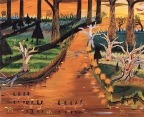
Collection: Collection of The Mennello Museum of American Art, Gift of Michael A. and Marilyn L. Mennello
Current Location: Nemours
latitude: 27.1028
longitude: -81.0736
Associated Artwork: Chief Osceola
Year: 1962
Significance: Cunningham regularly painted locations, but seldom real people or historical events. His painting "Summertime at Fort San Marcos" depicts true historical regalia, but this work specifically delineates Chief Osceola. This underlines Cunningham's interest in the Seminole people and way of life, as both works seem to be a focus on his life, as it is here, and his death, as represented in "Fort San Marcos."
URL Image:

Collection: Collection of The Mennello Museum of American Art, Gift of Michael A. and Marilyn L. Mennello
Current Location: Nemours
latitude: 27.1028
longitude: -81.0736
Location: Everglades, FL
Associated Artwork: The Everglades
Year: 1960
Significance: Although Cunningham stated that this painting was purchased by First Lady Jacqueline Kennedy for the White House restoration, based on a letter sent to Cunningham by her social secretary, Letitia Baldrige, thanking him for the painting it is more likely he gifted the work. Possibly, the First Lady or an associate admired the work and he gifted it as a result. The acceptance of the work demonstrates the esteem of art reflecting America. In 1961, it hung prominently in the White House, where it could be glimpsed during presidential television interviews.
URL Image:
Collection: Collection of the John F. Kennedy Presidential Library and Museum, Boston
Current Location: John F. Kennedy Presidential Library and Museum
latitude: 27.1024
longitude: -81.0734
Associated Artwork: The Everglades
Year: 1960
Significance: Although Cunningham stated that this painting was purchased by First Lady Jacqueline Kennedy for the White House restoration, based on a letter sent to Cunningham by her social secretary, Letitia Baldrige, thanking him for the painting it is more likely he gifted the work. Possibly, the First Lady or an associate admired the work and he gifted it as a result. The acceptance of the work demonstrates the esteem of art reflecting America. In 1961, it hung prominently in the White House, where it could be glimpsed during presidential television interviews.
URL Image:

Collection: Collection of the John F. Kennedy Presidential Library and Museum, Boston
Current Location: John F. Kennedy Presidential Library and Museum
latitude: 27.1024
longitude: -81.0734
Location: Everglades, FL
Associated Artwork: Everglades Settlement, Dawn
Year: no date
Significance: One of Cunningham's most notable skills is his use of light and color to create atmosphere in his works. Dawn, as created here, storms, and other weather conditions are all created with mastery and perhaps more vibrancy than nature truly allows.
URL Image:
Collection: ~
Current Location: ~
latitude: 27.1024
longitude: -81.0737
Associated Artwork: Everglades Settlement, Dawn
Year: no date
Significance: One of Cunningham's most notable skills is his use of light and color to create atmosphere in his works. Dawn, as created here, storms, and other weather conditions are all created with mastery and perhaps more vibrancy than nature truly allows.
URL Image:

Collection: ~
Current Location: ~
latitude: 27.1024
longitude: -81.0737
Location: Little River, SC
Associated Artwork: Gathering Clouds Off Little River Inlet
Year: 1962
Significance: Cunningham was born in Edgecombe, Maine, not far from Boothbay Harbor, Maine, where a hub of folk-artists lived and worked. It was here that Cunningham began to take on the title of "Primitive Artist." This piece in particular is reminiscent of fellow Maine native Marsden Hartley.
URL Image:
Collection: Collection of Marilyn L. and Michael A. Mennello
Current Location: ~
latitude: 33.8732
longitude: -78.6142
Associated Artwork: Gathering Clouds Off Little River Inlet
Year: 1962
Significance: Cunningham was born in Edgecombe, Maine, not far from Boothbay Harbor, Maine, where a hub of folk-artists lived and worked. It was here that Cunningham began to take on the title of "Primitive Artist." This piece in particular is reminiscent of fellow Maine native Marsden Hartley.
URL Image:

Collection: Collection of Marilyn L. and Michael A. Mennello
Current Location: ~
latitude: 33.8732
longitude: -78.6142
Location: Hilton Head Island, SC
Associated Artwork: Hilton Head
Year: 1938
Significance: Cunningham almost exclusively uses a bird's-eye point of view, and frequently painted his horizons on a curve. Once, when asked why the horizons were curved, Cunningham viewed the question as criticism and responded that they must be one of those people who believe the earth is flat.
URL Image:
Collection: Private Collection, Los Angeles
Current Location: ~
latitude: 32.2163
longitude: -80.7526
Associated Artwork: Hilton Head
Year: 1938
Significance: Cunningham almost exclusively uses a bird's-eye point of view, and frequently painted his horizons on a curve. Once, when asked why the horizons were curved, Cunningham viewed the question as criticism and responded that they must be one of those people who believe the earth is flat.
URL Image:

Collection: Private Collection, Los Angeles
Current Location: ~
latitude: 32.2163
longitude: -80.7526
Location: Oyster Bay, NY
Associated Artwork: Houseboat at Oyster Keys
Year: no date
Significance: Cunningham painted with his own personal transformation of scale and color palette, which contributed to his "folk Platonism." This Platonic painting style stems from an on-going debate between followers of the philosophers Aristotle and Plato regarding the truth of the concrete world versus the transcendent view which can only be experienced through art.
URL Image:
Collection: Collection of The Mennello Museum of American Art
Current Location: The Mennello Museum of American Art
latitude: 40.7849
longitude: -73.5359
Associated Artwork: Houseboat at Oyster Keys
Year: no date
Significance: Cunningham painted with his own personal transformation of scale and color palette, which contributed to his "folk Platonism." This Platonic painting style stems from an on-going debate between followers of the philosophers Aristotle and Plato regarding the truth of the concrete world versus the transcendent view which can only be experienced through art.
URL Image:

Collection: Collection of The Mennello Museum of American Art
Current Location: The Mennello Museum of American Art
latitude: 40.7849
longitude: -73.5359
Location: St. Augustine, FL
Associated Artwork: Imaginary Harbor, St. Augustine
Year: no date
Significance: Earl Cunningham used broad, flat space, and vivid color to create imaginary and idealized landscapes filled with unlikely elements. Drawing on his vision of a sublime past, Cunningham painted a serene and unpolluted America.
URL Image:
Collection: Private Collection
Current Location: ~
latitude: 29.9014
longitude: -81.3126
Associated Artwork: Imaginary Harbor, St. Augustine
Year: no date
Significance: Earl Cunningham used broad, flat space, and vivid color to create imaginary and idealized landscapes filled with unlikely elements. Drawing on his vision of a sublime past, Cunningham painted a serene and unpolluted America.
URL Image:

Collection: Private Collection
Current Location: ~
latitude: 29.9014
longitude: -81.3126
Location: Bay Point Marina Co, FL
Associated Artwork: Springtime at Bay Point, Georgia
Year: no date
Significance: Cunningham seems to have been particularly interested with evenings and dawns, and seasons of the year. This is reflected in the intense color choices he was fond of, as well as the titles he assigned to the works, such as this one Springtime at Bay Point, Georgia, and others included here.
URL Image:
Collection: ~
Current Location: ~
latitude: 30.1452
longitude: -85.7277
Associated Artwork: Springtime at Bay Point, Georgia
Year: no date
Significance: Cunningham seems to have been particularly interested with evenings and dawns, and seasons of the year. This is reflected in the intense color choices he was fond of, as well as the titles he assigned to the works, such as this one Springtime at Bay Point, Georgia, and others included here.
URL Image:

Collection: ~
Current Location: ~
latitude: 30.1452
longitude: -85.7277
Location: Palm Beach, FL
Associated Artwork: Palm Beach
Year: 1950
Significance: There is reason to believe that Cunningham's art served as a way for him to integrate himself with the world and reconcile his youthful adventures with the trials of old age. In recreating these locations, Cunningham allowed himself some room to play: elements slip from one geographical location to another, resulting in New England houses on the shores of South Carolina or New England scenes with pink flamingos.
URL Image:
Collection: Collection of Michael A. Mennello
Current Location: The Mennello Museum of American Art
latitude: 26.756
longitude: -80.0364
Associated Artwork: Palm Beach
Year: 1950
Significance: There is reason to believe that Cunningham's art served as a way for him to integrate himself with the world and reconcile his youthful adventures with the trials of old age. In recreating these locations, Cunningham allowed himself some room to play: elements slip from one geographical location to another, resulting in New England houses on the shores of South Carolina or New England scenes with pink flamingos.
URL Image:

Collection: Collection of Michael A. Mennello
Current Location: The Mennello Museum of American Art
latitude: 26.756
longitude: -80.0364
Location: Pleasant Point, ME
Associated Artwork: Norsemen Discovering the New World
Year: 1930
Significance: Cunningham took liberties in his recreations of historical events, such as here where Viking ships share the water with Native American canoes. Drawing on his imagination and real life observations, he populated waterways with Native American canoes, Norse vessels and late Nineteenth and early Twentieth Century sailing ships. Additionally, the Indians shown paddling wear feather headdresses that look remarkably like those worn by the Passamaquoddy residents of Pleasant Point, Maine. He grew up hearing tales about Norsemen exploring the Americas, had a special affinity for Indian culture and artifacts, and was familiar with a variety of sailing vessels.
URL Image:
Collection: Collection of William E. Heyler
Current Location: ~
latitude: 43.9576
longitude: -69.2948
Associated Artwork: Norsemen Discovering the New World
Year: 1930
Significance: Cunningham took liberties in his recreations of historical events, such as here where Viking ships share the water with Native American canoes. Drawing on his imagination and real life observations, he populated waterways with Native American canoes, Norse vessels and late Nineteenth and early Twentieth Century sailing ships. Additionally, the Indians shown paddling wear feather headdresses that look remarkably like those worn by the Passamaquoddy residents of Pleasant Point, Maine. He grew up hearing tales about Norsemen exploring the Americas, had a special affinity for Indian culture and artifacts, and was familiar with a variety of sailing vessels.
URL Image:

Collection: Collection of William E. Heyler
Current Location: ~
latitude: 43.9576
longitude: -69.2948
Location: Pine Point, ME
Associated Artwork: Sunrise at Pine Point, Maine
Year: 1950
Significance: Born in Maine, this work demonstrates Cunningham's fond memories. He paints ships, pine trees, a striped lighthouse, coastal structures, and fishermen on the docks. The early morning light, depicted here, was one of Cunningham's specialties when it comes to color and its use.
URL Image:
Collection: Collection of Ross L. Silverbach
Current Location: The Mennello Museum of American Art
latitude: 43.5426
longitude: -70.3328
Associated Artwork: Sunrise at Pine Point, Maine
Year: 1950
Significance: Born in Maine, this work demonstrates Cunningham's fond memories. He paints ships, pine trees, a striped lighthouse, coastal structures, and fishermen on the docks. The early morning light, depicted here, was one of Cunningham's specialties when it comes to color and its use.
URL Image:

Collection: Collection of Ross L. Silverbach
Current Location: The Mennello Museum of American Art
latitude: 43.5426
longitude: -70.3328
Location: Frampton Inlet, SC
Associated Artwork: Busy Day at Frompton Inlet
Year: 1952
Significance: Due to Cunningham's tendency to paint from memory, and far removed from the location, the idiosyncrasies between his paintings and real life are easily explained. This also explains why his titles sometimes contain misspellings. In this case, the name of the real life location is FrAmpton, rather than FrOmpton.
URL Image:
Collection: Collection of Susan and David Douglass
Current Location: ~
latitude: 32.535
longitude: -80.256
Associated Artwork: Busy Day at Frompton Inlet
Year: 1952
Significance: Due to Cunningham's tendency to paint from memory, and far removed from the location, the idiosyncrasies between his paintings and real life are easily explained. This also explains why his titles sometimes contain misspellings. In this case, the name of the real life location is FrAmpton, rather than FrOmpton.
URL Image:

Collection: Collection of Susan and David Douglass
Current Location: ~
latitude: 32.535
longitude: -80.256
Location: Nassau Sound, FL
Associated Artwork: Nassau Sound
Year: 1945
Significance: In art, symmetry is a traditional element and seeks to bring order to a chaotic world. For Cunningham, symmetry is the way he brings his personal experiences into a universal language, although it is not rigidly followed. Rather, Cunningham is more interested in finding a balance between all corners of the canvas as seen in the variety of repetition found in this work.
URL Image:
Collection: Collection of Mrs. Sylvia Overby
Current Location: The Mennello Museum of American Art
latitude: 30.495
longitude: -81.4142
Associated Artwork: Nassau Sound
Year: 1945
Significance: In art, symmetry is a traditional element and seeks to bring order to a chaotic world. For Cunningham, symmetry is the way he brings his personal experiences into a universal language, although it is not rigidly followed. Rather, Cunningham is more interested in finding a balance between all corners of the canvas as seen in the variety of repetition found in this work.
URL Image:

Collection: Collection of Mrs. Sylvia Overby
Current Location: The Mennello Museum of American Art
latitude: 30.495
longitude: -81.4142
Location: Spoonbill Point, St. Augustine, FL
Associated Artwork: Spoonbill Point
Year: 1950
Significance: This work demonstrates some of Cunningham's favored tendencies: strong use of abstracted color, sea surrounded by land, transformation of scale, and a white-sailed boat.
URL Image:
Collection: Collection of Frederick and Sue Weingeroff
Current Location: ~
latitude: 29.8968
longitude: -81.2925
Associated Artwork: Spoonbill Point
Year: 1950
Significance: This work demonstrates some of Cunningham's favored tendencies: strong use of abstracted color, sea surrounded by land, transformation of scale, and a white-sailed boat.
URL Image:

Collection: Collection of Frederick and Sue Weingeroff
Current Location: ~
latitude: 29.8968
longitude: -81.2925
Location: Bremen, ME
Associated Artwork: Warm Afternoon at Broad Cove
Year: 1955
Significance: Cunningham painted with a collection of artist paint as well as commercial paint, such as housepaint. He was known to purchase cans of paint from yard sales, and have as many as twenty to thirty cans in his studio. It's possible that the pinks, greens, and yellows so prominent in his works, such as this one, are commercial paints.
URL Image:
Collection: Collection of Michael A. Mennello
Current Location: The Mennello Museum of American Art
latitude: 44.0379
longitude: -69.4148
Associated Artwork: Warm Afternoon at Broad Cove
Year: 1955
Significance: Cunningham painted with a collection of artist paint as well as commercial paint, such as housepaint. He was known to purchase cans of paint from yard sales, and have as many as twenty to thirty cans in his studio. It's possible that the pinks, greens, and yellows so prominent in his works, such as this one, are commercial paints.
URL Image:

Collection: Collection of Michael A. Mennello
Current Location: The Mennello Museum of American Art
latitude: 44.0379
longitude: -69.4148
Location: Lighthouse Point, FL
Associated Artwork: Off the Coast of White Lighthouse Point
Year: 1950
Significance: Cunningham often plays with the abstract power of color, which can be viewed in this work. This use of color is seen in Symbolist works, a movement including artists Paul Gauguin and Henri Matisse. In this way, Cunningham claimed for folk art various avant-garde concepts permeating popular culture.
URL Image:
Collection: Collection of Michael A. Mennello and Marilyn L. Mennello
Current Location: ~
latitude: 26.2756
longitude: -80.0873
Associated Artwork: Off the Coast of White Lighthouse Point
Year: 1950
Significance: Cunningham often plays with the abstract power of color, which can be viewed in this work. This use of color is seen in Symbolist works, a movement including artists Paul Gauguin and Henri Matisse. In this way, Cunningham claimed for folk art various avant-garde concepts permeating popular culture.
URL Image:

Collection: Collection of Michael A. Mennello and Marilyn L. Mennello
Current Location: ~
latitude: 26.2756
longitude: -80.0873
Location: Black Mountain, NC
Associated Artwork: Sailing by Woodpecker Hollow
Year: 1970
Significance: When Cunningham makes use of his mainstays, such as the sailing vessels here, he reinforces nineteenth century optimism, and supports the isolationist view from the modern world; Cunningham is reacting against change in the world.
URL Image:
Collection: Collection of Michael A. Mennello and Marilyn L. Mennello
Current Location: ~
latitude: 35.6
longitude: -82.3
Associated Artwork: Sailing by Woodpecker Hollow
Year: 1970
Significance: When Cunningham makes use of his mainstays, such as the sailing vessels here, he reinforces nineteenth century optimism, and supports the isolationist view from the modern world; Cunningham is reacting against change in the world.
URL Image:

Collection: Collection of Michael A. Mennello and Marilyn L. Mennello
Current Location: ~
latitude: 35.6
longitude: -82.3
Location: Black Mountain, NC
Associated Artwork: Looking Over Woodpecker Hollow
Year: 1970
Significance: Cunningham painted on Masonite, a naturally smooth material which allowed for enamel-like surfaces for his final products. He also worked to enhance this smooth surface through a variety of techniques: scratching through paint, feathered brushstrokes, underpainting, and heavy impasto. His preference for scratching and underpainting places him with Henri Matisse, as Matisse also made use of these techniques.
URL Image:
Collection: Collection of Michael A. Mennello and Marilyn L. Mennello
Current Location: ~
latitude: 35.605
longitude: -82.305
Associated Artwork: Looking Over Woodpecker Hollow
Year: 1970
Significance: Cunningham painted on Masonite, a naturally smooth material which allowed for enamel-like surfaces for his final products. He also worked to enhance this smooth surface through a variety of techniques: scratching through paint, feathered brushstrokes, underpainting, and heavy impasto. His preference for scratching and underpainting places him with Henri Matisse, as Matisse also made use of these techniques.
URL Image:

Collection: Collection of Michael A. Mennello and Marilyn L. Mennello
Current Location: ~
latitude: 35.605
longitude: -82.305
Location: Spoonbill Point, St. Augustine, FL
Associated Artwork: Sunrise at Spoonbill Point
Year: 1960
Significance: This work demonstrates another of Cunningham's tendencies: the melding of water and sky on the horizon. It is difficult to distinguish where the water ends, even with the sailboats sporting Cunningham's preferred white sails.
URL Image: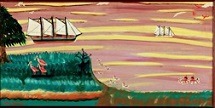
Collection: Collection of Michael A. Mennello and Mariyln L. Mennello
Current Location: ~
latitude: 29.8968
longitude: -81.2925
Associated Artwork: Sunrise at Spoonbill Point
Year: 1960
Significance: This work demonstrates another of Cunningham's tendencies: the melding of water and sky on the horizon. It is difficult to distinguish where the water ends, even with the sailboats sporting Cunningham's preferred white sails.
URL Image:

Collection: Collection of Michael A. Mennello and Mariyln L. Mennello
Current Location: ~
latitude: 29.8968
longitude: -81.2925
Location: York Harbor, ME
Associated Artwork: York Harbor Boat House
Year: 1955
Significance: Cunningham had a strong desire for order, in his antique shop and his paintings. The limitations in his paintings, however, also provided him with the opportunity to play. His use of symmetrical themes allowed him to play with scale within the canvas itself, and make the elements he was most interested in larger, i.e. the birds, schooners, or plant life. This also gives the works more emotional investment.
URL Image:
Collection: Collection of Michael A. Mennello and Marilyn L. Mennello
Current Location: ~
latitude: 43.1368
longitude: -70.6456
Associated Artwork: York Harbor Boat House
Year: 1955
Significance: Cunningham had a strong desire for order, in his antique shop and his paintings. The limitations in his paintings, however, also provided him with the opportunity to play. His use of symmetrical themes allowed him to play with scale within the canvas itself, and make the elements he was most interested in larger, i.e. the birds, schooners, or plant life. This also gives the works more emotional investment.
URL Image:

Collection: Collection of Michael A. Mennello and Marilyn L. Mennello
Current Location: ~
latitude: 43.1368
longitude: -70.6456
Location: Pleasant Point, SC
Associated Artwork: Town on Pleasant Point Bay
Year: 1930
Significance: Although Cunningham had a great amount of detail in each work, he maintained in interest in objects serving as symbols. Often, the sea served as a symbol of change and freedom, but the openness is held in check by surrounding land.
URL Image: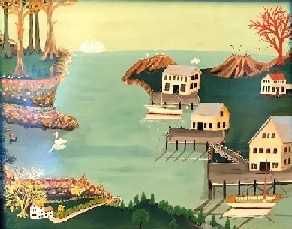
Collection: Collection of The Mennello Museum of American Art
Current Location:
latitude: 32.4726
longitude: -80.6789
Associated Artwork: Town on Pleasant Point Bay
Year: 1930
Significance: Although Cunningham had a great amount of detail in each work, he maintained in interest in objects serving as symbols. Often, the sea served as a symbol of change and freedom, but the openness is held in check by surrounding land.
URL Image:

Collection: Collection of The Mennello Museum of American Art
Current Location:
latitude: 32.4726
longitude: -80.6789
Location: Black Mountain, NC
Associated Artwork: Dry Dock at Woodpecker Hollow
Year: 1970
Significance: Cunningham's view of the past can be seen as whimsical, but it was very serious for him. One of the most noticeable manipulation of timelines is his inclusion of Norse Viking ships, some of which can be seen here. Although they may have a source in popular media of the time, it's more likely these inclusions stem from the popular New England folklore about Leif Eriksson.
URL Image:
Collection: Collection of The Mennello Museum of American Art
Current Location: The Mennello Museum of American Art
latitude: 35.6025
longitude: -82.3025
Associated Artwork: Dry Dock at Woodpecker Hollow
Year: 1970
Significance: Cunningham's view of the past can be seen as whimsical, but it was very serious for him. One of the most noticeable manipulation of timelines is his inclusion of Norse Viking ships, some of which can be seen here. Although they may have a source in popular media of the time, it's more likely these inclusions stem from the popular New England folklore about Leif Eriksson.
URL Image:

Collection: Collection of The Mennello Museum of American Art
Current Location: The Mennello Museum of American Art
latitude: 35.6025
longitude: -82.3025
Location: Ochopee, FL
Associated Artwork: Houseboat at Cypress Swamp
Year: 1945
Significance: Color was a primary consideration for Cunningham. He often meticulously planned out his paintings through sketching and drawing. Within these sketches, he would note the colors to be used: Orange Brown Sky and Water, Blue Sky and Water Some Greenish Yellow Sun Set.
URL Image:
Collection: Collection of The Mennello Museum of American Art
Current Location: The Mennello Museum of American Art
latitude: 25.9015
longitude: -81.3034
Associated Artwork: Houseboat at Cypress Swamp
Year: 1945
Significance: Color was a primary consideration for Cunningham. He often meticulously planned out his paintings through sketching and drawing. Within these sketches, he would note the colors to be used: Orange Brown Sky and Water, Blue Sky and Water Some Greenish Yellow Sun Set.
URL Image:

Collection: Collection of The Mennello Museum of American Art
Current Location: The Mennello Museum of American Art
latitude: 25.9015
longitude: -81.3034
Location: Everglades, FL
Associated Artwork: Seminole Brown Water
Year: 1950
Significance: Viking ships share harbors with Native American canoes and Yankee schooners, and Seminole Indians shown paddling wear feather headdresses that look remarkably like those worn by the Passamaquoddy residents of Pleasant Point, Maine. Such juxtapositions suggest Cunningham's idealized view of an integrated nation, where life was simple and elements of modern life were absent.
URL Image: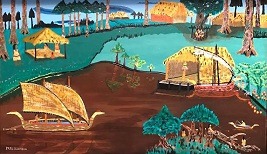
Collection: Collection of The Mennello Museum of American Art
Current Location: The Mennello Museum of American Art
latitude: 27.1023
longitude: -81.0731
Associated Artwork: Seminole Brown Water
Year: 1950
Significance: Viking ships share harbors with Native American canoes and Yankee schooners, and Seminole Indians shown paddling wear feather headdresses that look remarkably like those worn by the Passamaquoddy residents of Pleasant Point, Maine. Such juxtapositions suggest Cunningham's idealized view of an integrated nation, where life was simple and elements of modern life were absent.
URL Image:

Collection: Collection of The Mennello Museum of American Art
Current Location: The Mennello Museum of American Art
latitude: 27.1023
longitude: -81.0731
Location: Everglades, FL
Associated Artwork: Seminole Big Cypress Village
Year: 1963
Significance: Cunningham began visiting Florida around a time of increasing interest in the lifestyle, culture and fate of its Seminole Indians, increasingly threatened by "progress" and pressure to leave their traditional villages for reservations.
URL Image:
Collection: Collection of Michael A. Mennello
Current Location: The Mennello Museum of American Art
latitude: 27.1028
longitude: -81.0733
Associated Artwork: Seminole Big Cypress Village
Year: 1963
Significance: Cunningham began visiting Florida around a time of increasing interest in the lifestyle, culture and fate of its Seminole Indians, increasingly threatened by "progress" and pressure to leave their traditional villages for reservations.
URL Image:

Collection: Collection of Michael A. Mennello
Current Location: The Mennello Museum of American Art
latitude: 27.1028
longitude: -81.0733
Location: Everglades, FL
Associated Artwork: Everglades Winter
Year: 1950-1955
Significance: A recurring theme in Cunningham's otherwise idyllic works is a bit of tragedy. Typically, as in this work, this appears in the form of fallen trees. These trees have been sawed rather than felled by natural means, and this is meant to symbolize human destruction.
URL Image: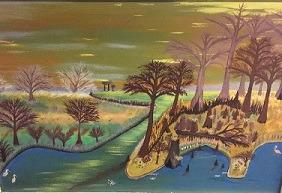
Collection: Collection of The Mennello Museum of American Art
Current Location: The Mennello Museum of American Art
latitude: 27.1024
longitude: -81.0731
Associated Artwork: Everglades Winter
Year: 1950-1955
Significance: A recurring theme in Cunningham's otherwise idyllic works is a bit of tragedy. Typically, as in this work, this appears in the form of fallen trees. These trees have been sawed rather than felled by natural means, and this is meant to symbolize human destruction.
URL Image:

Collection: Collection of The Mennello Museum of American Art
Current Location: The Mennello Museum of American Art
latitude: 27.1024
longitude: -81.0731
Location: Everglades, FL
Associated Artwork: Seminole Morning Glory
Year: 1975
Significance: Cunningham captured the look of the murky, brown water flowing through South Florida swamplands and the tall trees and lush vegetation of these areas.
URL Image:
Collection: Collection of The Mennello Museum of American Art
Current Location: Nemours
latitude: 27.1029
longitude: -81.0736
Associated Artwork: Seminole Morning Glory
Year: 1975
Significance: Cunningham captured the look of the murky, brown water flowing through South Florida swamplands and the tall trees and lush vegetation of these areas.
URL Image:

Collection: Collection of The Mennello Museum of American Art
Current Location: Nemours
latitude: 27.1029
longitude: -81.0736
Location: Everglades, FL
Associated Artwork: Seminole Indian Summer Camp
Year: 1963
Significance: Cunningham claimed to have spent time with the Seminoles in the Everglades, but whether he ever did or not, he was fascinated by them and depicted them in many important paintings, including this one.
URL Image:
Collection: Collection of Smithsonian American Art Museum, Gift of the Michael A. and Marilyn L. Mennello
Current Location: National Museum of American Art, Smithsonian Institution
latitude: 27.1023
longitude: -81.0732
Associated Artwork: Seminole Indian Summer Camp
Year: 1963
Significance: Cunningham claimed to have spent time with the Seminoles in the Everglades, but whether he ever did or not, he was fascinated by them and depicted them in many important paintings, including this one.
URL Image:

Collection: Collection of Smithsonian American Art Museum, Gift of the Michael A. and Marilyn L. Mennello
Current Location: National Museum of American Art, Smithsonian Institution
latitude: 27.1023
longitude: -81.0732
Location: Everglades, FL
Associated Artwork: Seminole Village with Lavendar Sky
Year: no date
Significance: "In each painting, the Everglades represents a place of security and cultural purity, free of the incursions of modern civilization that for many meant the pollution of an ideal and peaceful world," observes curator Virginia Mecklenburg in "Earl Cunninham's America" (2007). She posits that Cunningham admired Seminoles because they, like himself, elected to live on their own terms.
URL Image: Collection: Collection of The Lightner Museum
Collection: Collection of The Lightner Museum
Current Location: The Lightner Museum
latitude: 27.1027
longitude: -81.0737
Associated Artwork: Seminole Village with Lavendar Sky
Year: no date
Significance: "In each painting, the Everglades represents a place of security and cultural purity, free of the incursions of modern civilization that for many meant the pollution of an ideal and peaceful world," observes curator Virginia Mecklenburg in "Earl Cunninham's America" (2007). She posits that Cunningham admired Seminoles because they, like himself, elected to live on their own terms.
URL Image:
 Collection: Collection of The Lightner Museum
Collection: Collection of The Lightner MuseumCurrent Location: The Lightner Museum
latitude: 27.1027
longitude: -81.0737
Location: Everglades, FL
Associated Artwork: Great White Heron, Seminole Village
Year: no date
Significance: Cunningham was aware of his critics and was sometimes hurt by the remarks made about his art. One such criticism regarded the scale of his birds, particularly the flamingos, in relation to the houses and people, but he was not inclined to change this aspect of his paintings. He took comfort in Picasso's freedom of expression, which he often compared to his own.
URL Image:
Collection: Orange County, FL
Current Location: Arts and Cultural Affairs Office
latitude: 27.1025
longitude: -81.0731
Associated Artwork: Great White Heron, Seminole Village
Year: no date
Significance: Cunningham was aware of his critics and was sometimes hurt by the remarks made about his art. One such criticism regarded the scale of his birds, particularly the flamingos, in relation to the houses and people, but he was not inclined to change this aspect of his paintings. He took comfort in Picasso's freedom of expression, which he often compared to his own.
URL Image:

Collection: Orange County, FL
Current Location: Arts and Cultural Affairs Office
latitude: 27.1025
longitude: -81.0731
Location: The Mennello Museum of American Art
Associated Artwork: https://www.mennellomuseum.org/
Year: est. Nov. 1998
Significance: This interactive map has been created for the purpose of providing a fun and educational way to learn more about Earl Cunningham and his works. This map focuses on works tied to particular locations, and provides context for the elements of the works, as well as their relevance to Cunningham's unique life. Enjoy! Resources: Garrett, W., Mecklenburg, V.M., Weekley, C. (2007). Earl cunningham's america. Washington D.C.: Smithsonian American Art Museum. / Heather James Fine Art. (2012). Earl cunningham: American fauve exhibition catalogue. Nov 2011-Apr 2012. Palm Desert, CA: Tompkins. / Hobbs, R. (1994). Earl cunningham: Painting an american eden. NY: Harry N. Abrams, Inc.
URL Image: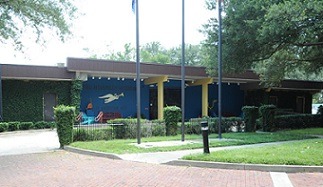
Collection: "The Mennello Museum of American Art endeavors to preserve, exhibit, and interpret our outstanding permanent collection of paintings by Earl Cunningham."
Current Location: 900 E Princeton St, Orlando, FL 32803
latitude: 28.57
longitude: -81.3673
Associated Artwork: https://www.mennellomuseum.org/
Year: est. Nov. 1998
Significance: This interactive map has been created for the purpose of providing a fun and educational way to learn more about Earl Cunningham and his works. This map focuses on works tied to particular locations, and provides context for the elements of the works, as well as their relevance to Cunningham's unique life. Enjoy! Resources: Garrett, W., Mecklenburg, V.M., Weekley, C. (2007). Earl cunningham's america. Washington D.C.: Smithsonian American Art Museum. / Heather James Fine Art. (2012). Earl cunningham: American fauve exhibition catalogue. Nov 2011-Apr 2012. Palm Desert, CA: Tompkins. / Hobbs, R. (1994). Earl cunningham: Painting an american eden. NY: Harry N. Abrams, Inc.
URL Image:

Collection: "The Mennello Museum of American Art endeavors to preserve, exhibit, and interpret our outstanding permanent collection of paintings by Earl Cunningham."
Current Location: 900 E Princeton St, Orlando, FL 32803
latitude: 28.57
longitude: -81.3673
Location: Everglades, FL
Associated Artwork: The Barbecue-Seminole Indian Style
Year: 1960
Significance: Cunningham felt a kinship with Native Americas, yet felt free to disregard tribal distinctions. In his works, Seminoles were just as likely to be shown in the customs of Plains Indians. In Maine, where Cunningham was born, tribal distinctions had disappeared and this may have led Cunningham to feel a similar kind of freedom.
URL Image:
Collection: Collection of Michael A. Mennello
Current Location: The Mennello Museum of American Art
latitude: 27.1029
longitude: -81.0737
Associated Artwork: The Barbecue-Seminole Indian Style
Year: 1960
Significance: Cunningham felt a kinship with Native Americas, yet felt free to disregard tribal distinctions. In his works, Seminoles were just as likely to be shown in the customs of Plains Indians. In Maine, where Cunningham was born, tribal distinctions had disappeared and this may have led Cunningham to feel a similar kind of freedom.
URL Image:

Collection: Collection of Michael A. Mennello
Current Location: The Mennello Museum of American Art
latitude: 27.1029
longitude: -81.0737
Location: Everglades, FL
Associated Artwork: Seminole Village, Deep in the Everglades
Year: 1965
Significance: Around 1950, Cunningham was commissioned to create a now-lost series of works of Native Americans which were sold individually for large sums. This may have encouraged Cunningham to consider his works in terms of related ideas, and incentivized him to develop themes - like Maine, Florida, Georgia, and South Carolina - which could provide more range and appeal for museums. It also allowed him to sustain his imaginary journeys away from the Over Fork Gallery.
URL Image:
Collection: Collection of The Mennello Museum of American Art, Gift of Michael A. and Marilyn L. Mennello
Current Location: The Mennello Museum of American Art
latitude: 27.1028
longitude: -81.0737
Associated Artwork: Seminole Village, Deep in the Everglades
Year: 1965
Significance: Around 1950, Cunningham was commissioned to create a now-lost series of works of Native Americans which were sold individually for large sums. This may have encouraged Cunningham to consider his works in terms of related ideas, and incentivized him to develop themes - like Maine, Florida, Georgia, and South Carolina - which could provide more range and appeal for museums. It also allowed him to sustain his imaginary journeys away from the Over Fork Gallery.
URL Image:

Collection: Collection of The Mennello Museum of American Art, Gift of Michael A. and Marilyn L. Mennello
Current Location: The Mennello Museum of American Art
latitude: 27.1028
longitude: -81.0737